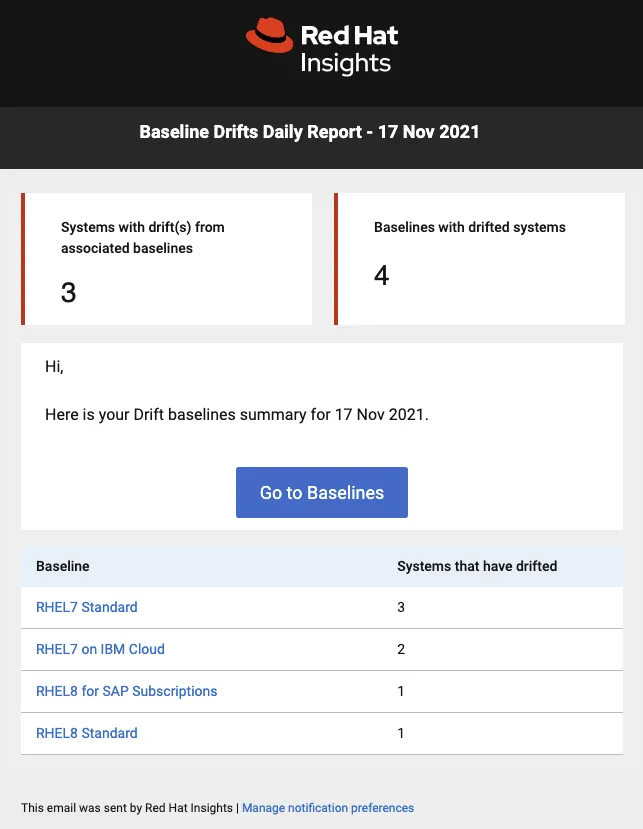Note: The Drift service referenced in this article was decommissioned and is no longer available in Red Hat Insights as of Oct 31, 2024. For more information, please refer to this knowledge base article or explore alternative capabilities in Red Hat Insights.
In this post:
What’s new in Drift notifications, including User Preferences settings to select delivery frequency of alerts, exports in JSON format and an improved view to compare system tags.
Drift is also now available as part of Insights for Ansible Automation Platform.
If you are looking to troubleshoot issues in your Red Hat Enterprise Linux (RHEL) hosts more easily, Drift is the right tool for you. Drift is part of Red Hat Insights, and Insights is included with your RHEL, Red Hat OpenShift or Red Hat Ansible Automation Platform subscription. In this post, we will explore new features added to Drift that support RHEL and, most recently, Ansible Automation Platform, including enhancements to Drift notifications and its user interface (UI) and user experience (UX).
Enhancements to Drift notifications
We introduced Drift notifications in a previous article. The functionality allows users to receive alerts when their system configuration differs—or drifts—from a standard operating environment, defined as a baseline.
We recently improved this feature by indicating the number of systems currently monitored for notifications, as well as by offering users the ability to switch on/off all notifications for a specific baseline at once using an enable/disable toggle switch. This functionality is available on each baseline in the Baseline view, as well as in the Baseline list view as displayed in Figure 1.

Figure 1. Baseline view with associated systems count and enable/disable toggle switch
Another improvement to note is the introduction of daily summaries for Drift notifications. The Drift service now aggregates alerts received during the duration of the day and sends a summary of all drift notifications daily.
Users can select their preferred way of receiving alerts by clicking their name in the upper-right corner of the Hybrid Cloud Console and selecting User Preferences > Notifications (Daily digest or Instant notification). Note that the instant notification selection may generate a large number of alerts.

Figure 2. User Preferences settings for Drift Notifications to select delivery frequency of alerts
Below is an example of a daily summary email notification, aggregating drift notifications for a specific baseline and associated systems.

Figure 3. Daily digest received for drift notifications
User interface and user experience enhancements
Based on feedback from users, we implemented a couple of improvements to fix user interface issues and ensure consistency between services.
In particular, we added the option to export all tables displayed in Drift (Baselines list, edit screens and Comparison screen) as a JSON file. This operation was only possible using the Insights API previously.
The export button present on each screen now provides both options to export as a CSV file or export as a JSON file. In doing so, we are providing an experience that is consistent with the other apps on Red Hat Hybrid Cloud Console.

Figure 4. Drift exporting functionality now supports both CSV and JSON files
Another requested improvement is the displaying and comparing of system tags within the Comparison view. The system tags are now displayed in a multi-level tree structure, and support multiple values per system tag name to enable even more precise troubleshooting. When multiple values are provided, Drift now analyzes all of them before highlighting differences and/or missing values. With this in place, the operation of comparing system tags is now similar to comparing system facts (if you are familiar with how that works).

Figure 5. System tags with multiple values are now compared individually in Drift
Other recent bug fixes and enhancements for the Drift application are documented in the latest Red Hat Insights 2021 Release Notes.
Drift for Ansible Automation Platform
Drift is now available as part of Insights for Ansible Automation Platform. System administrators can use Drift to compare configurations, define baselines and, ultimately, perform root-cause analysis of issues during troubleshooting of their Ansible Automation Platform infrastructure. They get the same capabilities as Insights for RHEL with the addition of specific Ansible Automation Platform facts.
The Insights System Profile now includes a dedicated Ansible section regrouping collected data from Ansible Automation Platform. Current implementation provides a set of facts that can be used to automatically identify a system as an Ansible Automation Platform infrastructure, as well as its version, saving the admin the effort of manually tagging the systems.

Figure 6. Example of additional system facts provided in System Profile for AAP
These Ansible Automation Platform facts are now exposed in the Drift application and can be used for comparing systems and creating baselines. Similarly they can be used when creating conditions targeting Ansible Automation Platform infrastructure in the Policies application.

Figure 7. Ansible Automation Platform facts are now exposed in Drift application for comparison
Conclusion
This post summarizes key additions to the Drift service implemented over the last few months as part of Red Hat Insights. These included improvements in the Drift notifications, enhancements in the user interface for better user experience, and the addition of specific system facts for Ansible Automation Platform infrastructure.
We encourage you to test these new features in Drift and provide feedback and suggestions using the Red Hat Customer Portal feedback form. See the getting started page to register your hosts and start exploring benefits from Red Hat Insights.
Sobre os autores
Joao Paulo Ramos is a software engineer on the Drift team, a part of Red Hat Insights. Ramos is a computer scientist and is now working on his master's degree in artificial intelligence. He is passionate about technology, music and loves to play drums.
Jerome Marc is a Red Hat Sr. Principal Product Manager with over 15 years of international experience in the software industry spanning product management and product marketing, software lifecycle management, enterprise-level application design and delivery, and solution sales.
Mais como este
How sovereign is your strategy? Introducing the Red Hat Sovereignty Readiness Assessment tool
Building the foundation for an AI-driven, sovereign future with Red Hat partners
Data Security And AI | Compiler
Data Security 101 | Compiler
Navegue por canal
Automação
Últimas novidades em automação de TI para empresas de tecnologia, equipes e ambientes
Inteligência artificial
Descubra as atualizações nas plataformas que proporcionam aos clientes executar suas cargas de trabalho de IA em qualquer ambiente
Nuvem híbrida aberta
Veja como construímos um futuro mais flexível com a nuvem híbrida
Segurança
Veja as últimas novidades sobre como reduzimos riscos em ambientes e tecnologias
Edge computing
Saiba quais são as atualizações nas plataformas que simplificam as operações na borda
Infraestrutura
Saiba o que há de mais recente na plataforma Linux empresarial líder mundial
Aplicações
Conheça nossas soluções desenvolvidas para ajudar você a superar os desafios mais complexos de aplicações
Virtualização
O futuro da virtualização empresarial para suas cargas de trabalho on-premise ou na nuvem

